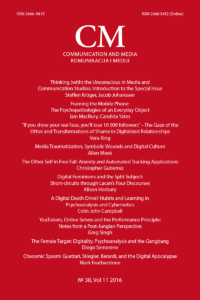Chaosmic Spasm: Guattari, Stiegler, Berardi, and the Digital Apocalypse
Chaosmic Spasm: Guattari, Stiegler, Berardi, and the Digital Apocalypse
Author(s): Mark FeatherstoneSubject(s): Psychology, Communication studies
Published by: Fakultet političkih nauka Univerziteta u Beogradu
Keywords: Berardi;Stiegler;Guattari;apocalypse;subjectivity;psychoanalysis;new media;globalisation;meaning;chaos;
Summary/Abstract: In this paper I explore the intersections of digital media, psychoanalysis, and the subject through reference to Felix Guattari's notion of the chaosmic spasm, which the Italian philosopher Franco Berardi picks up in his work and most recently his book And. Guattari's idea, which appears in his Chaosmosis, designates the fatal acceleration of the media semio-universe towards spasm, or apocalyptic collapse, and the emergence of some new form of schizoid organisation. Following an exploration of Guattari's idea, and a broader discussion of its relationship to his wider thought and Anti- Oedipal collaborations with Deleuze, I consider how Bernard Stiegler may be seen to provide a meta-historical account of Guattari's concept of the spasm in his Technics and Time. According to Stiegler's account, the hyper-acceleration of media forms results in a process of disorientation and de-subjectivization where the individual is destroyed because of their inability to situate themselves in social, symbolic, structures that have collapsed towards hyper-rational, meaningless forms. In Lacanian terms, psychosis becomes a kind of generalised condition. In response to this generalisation of madness, Stiegler imagines the need for a new politics of knowledge and grammar that is able to suture individuals back into wider social systems and provide the kind of secure, careful, space that D. W. Winnicott writes about in his work on play. In order to unpack what this politics of culture and knowledge might comprise, I turn to Guattari's work on schizoid subjectivity, or endless subjectivization without subjectivity, and Berardi's contrast between financial semio-capitalism and poetry, in order to suggest an ethical mode of thought and cultural expression that might capture the political core of Stiegler's vision and paint a picture of what human thought might look like on the other side of the new media apocalypse, the chaosmic spasm.
Journal: CM Komunikacija i mediji
- Issue Year: 11/2016
- Issue No: 38
- Page Range: 243-268
- Page Count: 26
- Language: English

